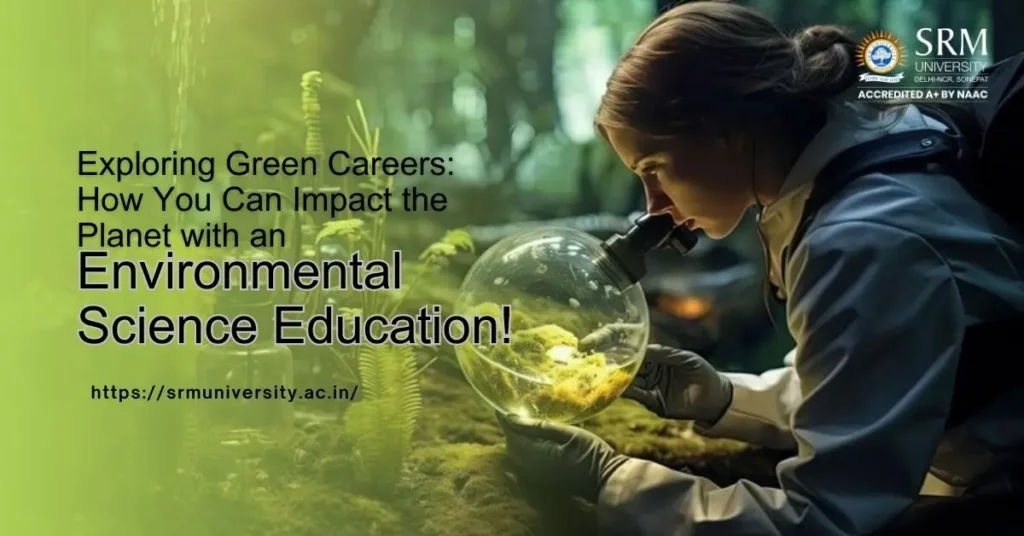The environment consists of everything around us—both natural and human-made—that affects life on Earth. It includes physical, chemical, and biological elements interacting with one another and with human activities. Environmental studies is the academic field that focuses on understanding the environment and addressing its challenges from a multidisciplinary perspective. Combining knowledge from natural sciences, social sciences, and the humanities, environmental studies aims to find solutions to pressing environmental issues.
If you’re considering studying environmental studies, this blog will explain what the field entails, its importance, and why pursuing it at a top university in Haryana could be a game-changer.
What Are Environmental Studies?

Environmental studies examine the interactions between humans and the natural world. The goal is to understand and solve environmental problems using scientific methods, ethical principles, and collaborative strategies. By studying environmental issues, you develop a deeper awareness of how human actions impact ecosystems and gain the tools to promote sustainable practices.
Scope and Importance of Environmental Studies
Environmental studies became a distinct field in the mid-20th century when concerns about the negative effects of industrialization, urbanization, and population growth began to rise. In India, the scope of environmental studies is vast, covering critical issues such as climate change, deforestation, air and water pollution, and biodiversity loss.
Studying environmental science at a top university in Haryana offers unique opportunities to engage with:
- Environmental policies and regulations.
- Sustainable development practices.
- Conservation strategies.
This field not only helps tackle environmental challenges but also fosters public awareness, enabling innovative solutions for a sustainable future.
5 Reasons to Study Environmental Studies
- Enhance Your Knowledge and Awareness
Environmental studies equip you with the knowledge to understand ecosystems and assess how human activities impact them. You learn to monitor and mitigate risks while promoting sustainability. - Develop Valuable Skills
The field teaches you analytical and problem-solving skills. You’ll gain expertise in using scientific tools and methods to address environmental challenges. - Foster Environmental Values
Studying environmental science helps you appreciate the importance of preserving natural resources and encourages you to adopt ethical conservation practices. - Engage in Governance and Advocacy
Environmental studies empower you to participate in policy-making, advocacy, and activism. You’ll be equipped to drive meaningful changes in how societies address environmental issues. - Inspire Innovation
The field encourages creativity, enabling you to develop sustainable technologies and practices that reduce environmental footprints. At a top university in Haryana, you’ll also have access to cutting-edge research facilities to fuel your ideas.
Environmental studies are increasingly important as the world grapples with challenges like global warming, pollution, and resource depletion. Here are some key benefits:
- Knowledge and Awareness: Learn about environmental systems, their processes, and human impacts.
- Skill Development: Gain expertise in assessing environmental risks and devising solutions.
- Civic Engagement: Participate actively in decision-making and governance.
- Innovation and Creativity: Develop technologies to promote sustainability.
- Values and Ethics: Build respect for the environment and its diversity.
Choosing a top university in Haryana ensures that you gain a comprehensive education in these areas, preparing you for impactful careers.
Top 10 Benefits of Environmental Education
- Boosts Creativity: Hands-on learning sparks imagination and engagement, enhancing student achievement.
- Real-World Connections: Helps students link classroom knowledge to practical, real-world applications.
- Develops Thinking Skills: Encourages critical and creative thinking for solving complex issues.
- Promotes Tolerance: Teaches students to understand diverse perspectives.
- Meets Academic Standards: Integrates multiple subjects into interdisciplinary learning.
- Fights Nature Deficit: Helps students reconnect with nature and enjoy outdoor activities.
- Encourages Healthy Lifestyles: Promotes physical activity and mental well-being.
- Strengthens Communities: Fosters a sense of connection and local engagement.
- Inspires Environmental Action: Empowers students to take meaningful steps for conservation.
- Builds Leadership Skills: Encourages active participation and leadership in environmental efforts.
Top 10 Careers in Environmental Science
A degree in environmental science opens doors to rewarding and impactful careers. Here are some top options:
- Environmental Engineer
Design solutions for pollution control, waste management, and sustainable infrastructure. - Environmental Health and Safety Specialist
Ensure public and environmental safety by identifying risks and enforcing regulations. - Chief Sustainability Officer
Lead organizations in adopting sustainable practices and reducing environmental impact. - Environmental Lawyer
Advocate for regulations, litigate cases, and advise on sustainability compliance. - Air Pollution Analyst
Monitor air quality and develop strategies for cleaner environments. - Wildlife Biologist
Study and conserve wildlife and ecosystems to maintain biodiversity. - Environmental Consultant
Advise businesses on minimizing their ecological footprint and meeting regulations. - Geoscientist
Study Earth’s processes and resources, contributing to sustainable development. - Environmental Microbiologist
Research microorganisms to address challenges like waste treatment and bioremediation. - Hydrologist
Analyze water resources to ensure efficient use and protection of aquatic systems.
At a top university in Haryana, you’ll receive the training and resources needed to excel in any of these careers.
Wrapping:
Environmental studies is a multidisciplinary field that addresses some of the most pressing challenges of our time. It integrates science, ethics, and policy to better understand and solve environmental problems. Studying at a top university in Haryana not only provides a solid foundation in this vital field but also prepares you for impactful careers that make a difference for the planet and its inhabitants.
Whether you’re passionate about wildlife conservation, sustainable technology, or policymaking, this field offers endless opportunities to create a positive impact.

